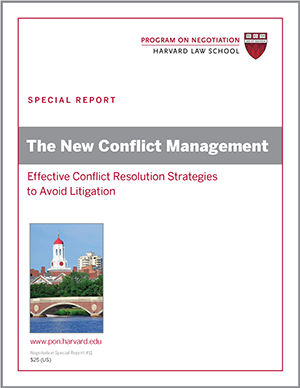
A 62-year-old salesman believes he has convincing evidence that his boss passed him over for a promotion because of his age. What options does he have? He could let the matter drop and perhaps look for another job. He could file an employment-discrimination lawsuit. Or, if his company offers mediation services, he could have the conflict mediated in the hope of gaining the promotion.
When deciding how to manage conflict at work, employers often lean toward mediation. In mediation, a neutral third-party mediator encourages both sides to present their views and helps them devise a mutually acceptable agreement. Ideally, mediation allows parties to air their grievances and work toward a solution at minimal cost to their organization.
Yet parties often approach negotiation and conflict management from different perspectives, differences that can lead to common negotiation mistakes and disappointing outcomes, two recent research studies suggest. The findings imply that managers need to take extra care when determining how to manage conflict at work.
Conflicts between Superiors and Subordinates
When a subordinate and superior are facing each other in negotiation, the process of finding an equitable solution can be complicated. If the salesman we described has the goal of being promoted, will he feel comfortable accusing his boss of ageism during mediation? Even if the two sides come to an agreement, will they be able to work together productively back at the office?
The question of how to manage conflict at work using mediation was examined in a Negotiation Journal study by researchers Katalien Bollen and Martin Euwema of the University of Leuven, Belgium, and Patrick Müller of the University of Mannheim, Germany. The team analyzed the transcripts of 50 labor mediation sessions in the Netherlands as well as surveys of some of the participants.
The results showed that supervisors and subordinates alike were satisfied with their mediation process overall, but that subordinates were less satisfied than the superiors. However, parties in both roles were similarly satisfied with the outcomes of their mediations.
In addition, subordinates who experienced a high level of uncertainty during the mediation were the least satisfied with the process. Because subordinates tend to have less experience with mediation than their superiors and may feel they have less control over the process, they may be more likely to experience uncertainty and anxiety during mediation.
The results suggest that mediators should acknowledge the complicating power dynamics that are likely to be present during the mediation. In particular, mediators could carefully explain the mediation context and its goals and procedures, as well as any alternatives, to parties when talks begin.
When One Side Feels More Aggrieved
Sometimes, an aggrieved party launches a mediation process with a party who is only vaguely aware that a conflict exists. For example, the employee who believes he was passed over for a promotion may not have previously discussed his concerns with his boss. One party may experience the conflict more deeply than the other, yet conflict negotiation, including mediation, often fails to take this “conflict asymmetry” into account.
To study how conflict asymmetry affects mediation, researchers Karen A. Jehn (Melbourne Business School), Joyce Rupert (Leiden University), Aukje Nauta (University of Amsterdam), and Seth van den Bossche (the TNO Work and Employment research institute, Amsterdam) surveyed 27 pairs of disputants in an educational context, also in the Netherlands, about their experience and satisfaction with a recent mediation. As reported in the journal Negotiation and Conflict Management Research, the team found that in most pairs, one party experienced more conflict than the other.
As compared to pairs that experienced similar levels of conflict, pairs with conflict asymmetry were less satisfied with the mediation process and outcomes. In particular, the less-aggrieved party perceived that the mediator was biased toward the more-aggrieved party. Less-aggrieved parties may feel overshadowed by counterparts who have a strong need to vent during the mediation.
To enhance their conflict management and negotiation skills, the researchers advise mediators to acknowledge when the process begins that differences in perceived conflict may be likely. And to avoid the appearance of bias, mediators should encourage the less-aggrieved party to express her or his point of view in addition to allowing the party who perceives more conflict to vent.
How to Manage Conflict at Work through Mediation:
- Investigate differences in status and perceived conflict before talks begin.
- Make sure lower-status parties understand how the process will unfold.
- Compensate for the tendency of more-aggrieved parties to dominate the discussion.
What methods have you used when determining how to manage conflict at work?




